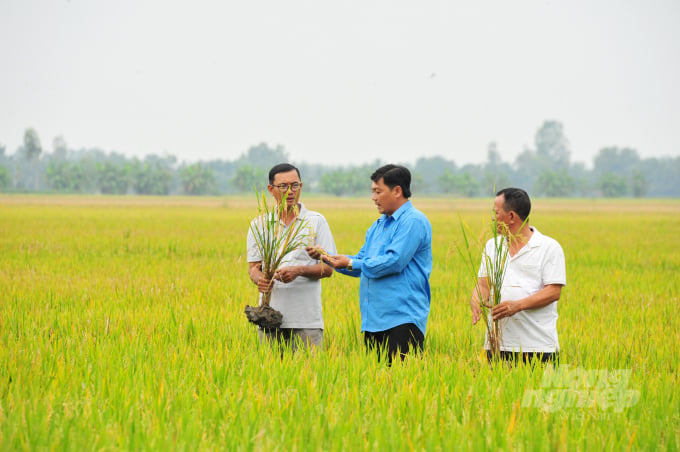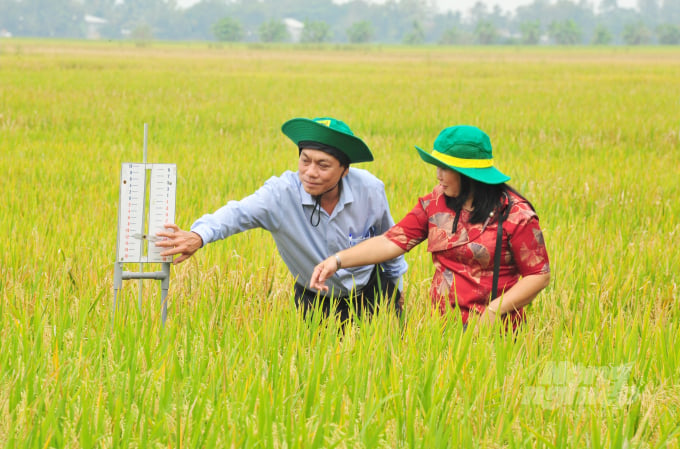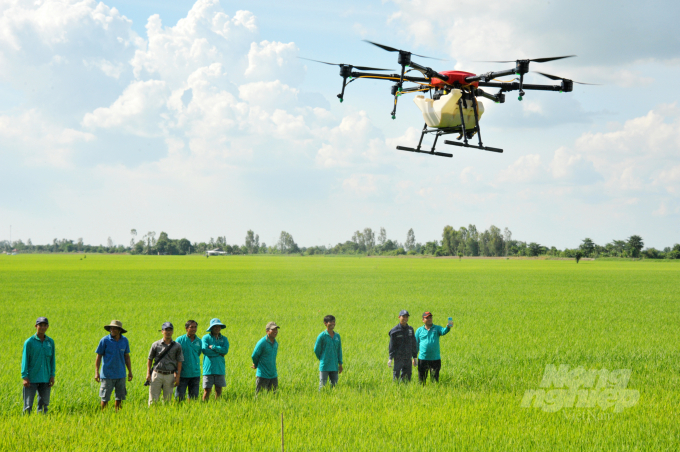June 18, 2025 | 02:49 GMT +7
June 18, 2025 | 02:49 GMT +7
Hotline: 0913.378.918
June 18, 2025 | 02:49 GMT +7
Hotline: 0913.378.918

For many years, Mekong Delta farmers have promoted the application of new techniques to rice production. Photo: Le Hoang Vu.
Mr. Le Thanh Tung, Deputy Director of the Department of Crop Production (Ministry of Agriculture and Rural Development), said that in the 2021 summer-autumn crop in the Mekong Delta, the average rice production cost is VND 3,728 per kilogram, an increase of VND 143 per kilogram compared with the 2020 summer-autumn crop.
Although the fertilizer and pesticides prices increased due to science and technology, the costs of seeds, fertilizers and pesticides have decreased. Therefore, the increase in production costs is insignificant, so farmers can still have a higher profit than the 2020 summer-autumn crop.
Some provinces have well-implemented technical solutions that have brought about high economic efficiency, such as Tien Giang province. In the summer-autumn crop, the province's rice yield is estimated at 6 tonnes per hectare. The total rice production cost is about VND 20 million per hectare. As a result, farmers' income reached VND 42 million per hectare, with a profit of VND 22 million per hectare, an increase of about VND 5 million compared to the 2020 summer-autumn crop.
To sustainably develop rice production for export, localities need to pay more attention to directing the synchronous implementation of advanced technical solutions into production.
Advanced technical solutions such as "3 decrease, 3 increase" and "1 must, 5 decrease" or focus on reducing the volume of sown rice seeds per unit area of rice cultivation. Reducing the number of seeds sown helps reduce investment costs in seeds, fertilizers, and pesticides by about VND 2-3 million per hectare. In addition, increasing the rate of rice varieties helps to increase the yield and rice quality.

Applying science and technology to agricultural production is the "key" to effectively reducing rice production costs. Photo: Le Hoang Vu.
Mr. Truong Kien Tho, Deputy Director of An Giang Department of Agriculture and Rural Development, said that the production cost of the 2021 summer-autumn rice crop in the province is VND 4,197 VND per kilogram, while the average cost from 2017 to now is VND 4,017. Production costs will be most affected by fertilizer prices. Therefore, in the 2021 autumn-winter crop and 2022 winter-spring, if agricultural input prices continue to increase, rice production costs are possible to increase.
In the 2021 autumn-winter crop, An Giang province has 161,000 hectares of rice. In the context of the Covid-19 epidemic and the high price of agricultural materials putting significant pressure on farmers, An Giang province's Department of Agriculture and Rural Development has come up with many technical solutions to reduce rice production costs.
Firstly, cutting production costs, including fertilizer, pesticide, seed, and harvesting costs, with current advanced technical measures. Specifically, it is applying mechanization in the field, using drones to spray and fertilize crops.
In addition, restart the program of integrated nutrient management for efficient use of fertilizers in the context of high fertilizer prices. In addition, farmers have increased the use of organic fertilizers to reduce pressure on the demand for inorganic fertilizers in the country.
It is especially promoting the application of Integrated Pest Management (IPM) in rice production, helping to reduce the cost of pesticides, healthy plants, ecological balance, and environmental protection.
An Giang province is developing models to link output with businesses, developing linkages between cooperatives and cooperative groups, supporting cooperatives, and developing food security projects.
To ensure efficiency in rice production, recently, the Ministry of Agriculture and Rural Development directed the Mekong Delta localities to widely and urgently propagated solutions to cope with the high prices of agricultural inputs and increase the rice industry's competitiveness.

Spraying pesticides with drones. Photo: Le Hoang Vu.
In addition, the Department of Agriculture and Rural Development of An Giang province has transferred and applied new technical advances, production processes and new technologies, methods of organizing production, and using new materials in production, such as new fertilizers, slow-release fertilizers, nano fertilizers, organic fertilizers, biological pesticides, microorganisms, biological products to improve efficiency and productivity.
An Giang province also quickly applied agricultural extension models that have been evaluated effectively in production, such as: using certified seeds, F1 seeds, mechanization in production... contributing to reducing the amount of seed sown in rice production, raising the rate of using quality rice varieties in production, increasing the rate of using F1 hybrids in the country.
With to the project implementation, the agricultural extension model is the information and communication activities for agricultural extension with different contents and forms, helping extension workers and farmers have more information about the good agricultural extension and advanced solutions.
The pilot project "Improve the efficiency of grassroots agricultural extension activities through the formation of community extension groups" is being implemented by the province. Through the project, community agricultural extension groups of the agricultural extension system were formed to advise, support, and transfer science and technology.
For many years, the National Agricultural Extension Center has coordinated with Binh Dien Fertilizer Joint Stock Company to implement the program "Smart rice farming to adapt to climate change in the Mekong Delta." With the support of scientists, the Advisory Board will provide direct and indirect advice on different information channels to guide farmers in pest management, use of fertilizers, and appropriate pesticides. The production methods to cope with climate change and weather are now effective.
Translated by Ha Phuc

(VAN) The results of national programs are essential for establishing a contemporary livestock sector that is well-equipped to meet the demands of both domestic and international markets, with robust biosafety standards.

(VAN) The UNESCO Global Geopark revalidation of Non nuoc Cao Bang and the transition to a two-tier administrative model are presently undergoing a pivotal moment in Cao Bang, the northernmost province of Vietnam.
/2025/06/13/5330-2-004539_953.jpg)
(VAN) Changing policy mindset and removing investment barriers are urgent requirements to open up new development space for enterprises in the agricultural sector.

(VAN) The areas include the restoration of five million hectares of marine ecosystems.

(VAN) Dr. Le Van Nguyen, Director of the Institute of E-Commerce Management (ECM), emphasizes the potential for green development through the cultivation of fruit trees, particularly in provinces such as Son La.

(VAN) VAAS and numerous Vietnamese enterprises have signed cooperation agreements with Japanese partners to promote agricultural technology and trade connectivity.
/2025/05/29/5625-12-214801_567.jpg)
(VAN) Provincial mergers in the Mekong Delta promise to streamline administration, expand inter-provincial raw material areas, and foster close linkages in agricultural value chains, benefiting both businesses and cooperatives.